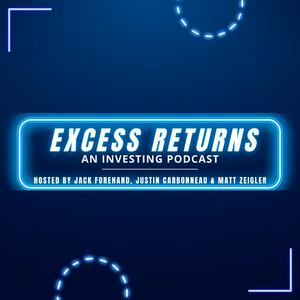The Case That We Are in the Early Stages of an AI Bull Market | Gene Munster and Doug Clinton
In this episode of Excess Returns, Gene Munster and Doug Clinton of Deepwater Asset Management join Justin and Jack to explore the technological, economic, and investing implications of AI. They discuss why they believe we’re still in the early stages of a multi-year bull market driven by AI, how the technology is reshaping jobs and productivity, and what it means for investors. The conversation also covers how companies like Nvidia, Apple, Tesla, and Meta fit into this AI cycle, the energy demands of AI, and the future of AI-driven investing through Intelligent Alpha and its GPT ETF.Topics covered:• Why Gene and Doug believe AI represents a once-in-a-generation wealth creation opportunity• How AI may impact corporate profitability and hiring trends• The political and social dynamics slowing AI adoption• Doug’s “detective, people-pleaser, and tastemaker” framework for future human jobs• How Intelligent Alpha uses large language models to manage portfolios• The advantages of AI-driven investment models over humans• Economic and market implications of an AI productivity boom• The hardware-data-application structure of technological cycles• The role of energy, especially nuclear and solar, in supporting AI growth• The competitive race among model providers like OpenAI, Google, and Meta• Apple’s long-term AI positioning and potential comeback• Tesla’s valuation, autonomy vision, and the future of robotics• The inevitability and function of bubbles in breakthrough technologies• The rise of private markets and retail investor access to innovation• Future frontiers in quantum computing and biotechnologyTimestamps:00:00 Introduction and Deepwater’s AI thesis03:00 Why AI marks a multi-year bull market opportunity08:00 Political reality and limits of AI deployment11:00 The future of human work: detectives, people-pleasers, tastemakers16:00 Inside Intelligent Alpha and the GPT ETF19:00 Why AI can outperform human managers25:00 How AI affects productivity, margins, and employment26:00 Hardware, data, and application cycle in AI28:00 The energy constraint: nuclear, gas, and solar29:30 The model race: OpenAI, Google, Meta34:00 Apple’s role and long-term AI potential39:30 Tesla, autonomy, and long-term disruption44:00 Are bubbles necessary for technological revolutions?49:00 Private vs. public investing in innovation51:00 Beyond AI: quantum computing and life extension technologies54:45 Closing thoughts


